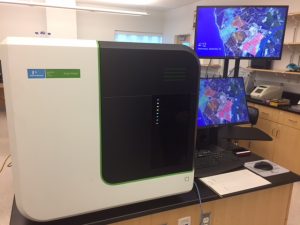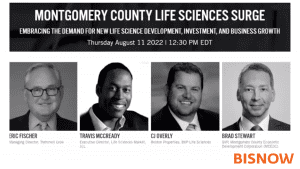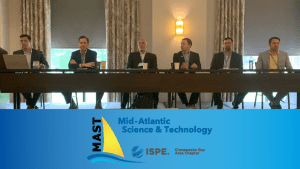New Technology Impacting Immune-Oncology Research Attracts National Audience at First Annual Bio-Trac Symposium
October 3, 2018
The First Annual Bio-Trac Symposium at the Bioscience Education Center at Montgomery College was sold out with attendees coming in from across the country. The two-day symposium was on Multiplex Immunofluorescence in Immune-Oncology, which is a rapidly advancing technology aiding researchers to explore the potential medical value of specific biomarkers and understand the role of the Tumor Microenvironment (TME) in Cancer Immunotherapy.
The importance of this topic was reflected by an impressive speaker line-up of world-class scientists, including a keynote lecture by Janis Taube, M.D., M.Sc., the Director for the Division of Dermatopathology at Johns Hopkins Medicine, a leading expert in the field. Wednesday devoted to lectures that included two panel discussions and several Q&As. See full Speaker lineup here.
“We get a great deal of satisfaction bringing in world renown experts to Bio-Trac events and make them available to our attendees,” shared Mark Nardone, Bio-Trac Director. “Bio-Trac provides a forum which allows researchers to gain access to current technologies while fostering an environment that promotes collaborations.”
The symposium was hosted by Bio-Trac with the sponsorship and support from MedImmune and PerkinElmer, who both also presented and moderated the day of lectures and the full day of hands-on workshops that comprised the full symposium.

Among the heavy-hitting speakers was Stephen Hewitt, M.D., Ph.D., Head of the Experimental Pathology Laboratory at NCI, and Editor in Chief of the Journal of Histochemistry and Cytochemistry. Hewitt spoke about the development and validation of multiplex IHC assays in a total test paradigm. Another highly anticipated speaker was Kurt Schalper, M.D., Ph.D. Assistant Professor of Pathology; Director, Translational Immuno-oncology Laboratory at Yale University School of Medicine. Schalper presented a lecture on the use of spatially resolved analysis for understanding the immune composition and therapeutic implication of human lung cancer. Another speaker, Adam Smith of Indica Labs, covered the use of HALO (AI) to target immune-oncology markers in the tumor microenvironment.
Hewitt agreed to lecture for two more important reasons, “I’ve spoken at Bio-Trac symposiums for years. I know the quality of the students. I know that Bio-Trac is going to provide great students and good interaction. Plus,” he added, “I was invited to talk on a topic I’m passionate about.” The symposium also allowed attendees like Louis Levy of Ultivue in Cambridge to network with others and keep his thumb on the pulse of the latest innovations in the field.
Michael Surace, Ph.D. said that MedImmune was pleased with the overbooked event and glad to be one of the sponsors because, “this approach to imaging is coming to the inflection point where it begins to move from a research tool a clinical tool, which we will begin to see in the next 5-7 years… We have fantastic modality but not the diagnostics to match it. Lots of people are looking to leverage this technology for their research but there is not a lot of guidance on how. People want guidance around the technology.”
The Course Director for the full day workshop was Jaime Rodriguez-Caneles, MD, FEBP, Senior Pathologist at MedImmune, and the workshop included hands-on training using PerkinElmer’s Vectra Polaris automated Quantitative Pathology Imaging System.

The Bioscience Education Center at Montgomery College was also a good pick. In addition to the impressive facilities, Hewitt said, “It’s a great location. You get MedImmune, you get Bethesda, you get Frederick, and you get people who will come down from Baltimore. The biotech space in Montgomery County is beginning to more actively percolate.” In part, this is due to MedImmune’s investment into the growth of the BioHealth Capital Region. The growing Immune Oncology hub is already home to well-known companies such as Immunomic Therapeutics, and high-profile startups like BeneVir (recently acquired by Jansen). Maryland has also recently attracted some big-name companies such as Kite – a Gilead Company, and Autolus Therapeutics.
Bio-Trac has provided hands-on biotechnology training workshops on a range of topics of importance to research scientists for more than thirty years. They also offer customized training for an organization’s particular research needs. In fact, the initial idea for this symposium came from a custom training Bio-Trac did earlier this year with Dr. Rodriguez at MedImmune.
There was already pre-symposium talk about making this an annual event and based off the attendance, the overall quality of the two-day event and importance of the topic, a Second Annual Bio-Trac Symposium is highly likely.
Visit www.biotrac.com for more upcoming workshops and events.
Author:
Gina Hagler, BioBuzz Contributor




